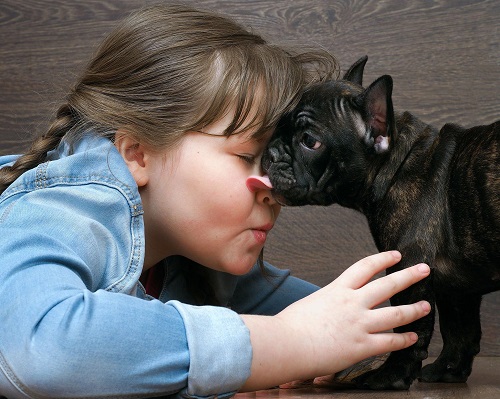A French Bulldog puppy is an adorable and energetic little companion that requires good nutrition to grow into a healthy and happy adult. This crucial stage of their development requires proper nutrition to ensure they receive all the nutrients they need. For a lifetime of good health, we should provide our French Bulldog puppies with the best practices for feeding. In this article we will discuss about how much to feed a french bulldog puppy?
Understanding the Nutritional Needs of French Bulldog Puppies
French Bulldog puppies, like all growing dogs, have specific nutritional requirements. The right balance of macronutrients, such as proteins, fats, and carbohydrates, is vital for their overall well-being. Proteins are crucial in muscle development and tissue repair, making them essential for your puppy’s growth. High-quality proteins from animal sources are ideal for meeting their needs.
How Much to Feed a French Bulldog Puppy?
French Bulldog puppies should also consume fats as part of their diet. They provide concentrated energy and support brain development. Omega-3 fatty acids, in particular, contribute to healthy skin and a shiny coat.
For your puppy to maintain his active lifestyle, he needs carbohydrates for energy. Opt for complex carbohydrates that release energy gradually and prevent sudden spikes in blood sugar levels.
Feeding Schedule for French Bulldog Puppies
Establishing a consistent feeding schedule for your French Bulldog puppy is crucial. At around 8 to 12 weeks, they should be fed four meals daily. As they grow older, you can gradually reduce the number of meals to three, then two, and finally one meal a day when they reach adulthood.
Ensure you follow age-specific feeding guidelines to prevent overfeeding or underfeeding. Keep an eye on their weight and adjust the portion sizes accordingly. Avoid free-feeding, which can lead to weight issues and disrupt eating habits.
Choosing the Right Food for Your French Bulldog Puppy
Selecting the right food for your French Bulldog puppy is crucial for their health and development. You have two primary options: commercial dog food or homemade diets. Both can be nutritionally adequate if chosen wisely.
When buying commercial dog food, always read the labels carefully. Look for products that contain high-quality protein sources and are free from artificial additives. Avoid foods that list “by-products” as the main ingredient.
If you opt for a homemade diet, consult a veterinarian or a canine nutritionist to ensure the diet meets all the necessary nutritional requirements. Be cautious about ingredients that might harm dogs, such as onions, grapes, or chocolate.
Introducing Solid Foods to Your French Bulldog Puppy
French Bulldog puppies are ready for solid food as they grow. Start the transition gradually, mixing small amounts of puppy food with their mother’s milk or a milk replacement formula. Over a few weeks, increase the proportion of solid food while reducing the milk.
Be patient during this process, as some puppies may be more hesitant to try new foods than others. Continuously monitor their reaction to the new diet and ensure they are not experiencing any adverse reactions.
Common Feeding Mistakes to Avoid
The best way to feed your French Bulldog puppy is to avoid mistakes that can negatively affect their health. One such error is feeding them table scraps. Human food may contain ingredients that harm dogs or cause digestive issues. Additionally, it can lead to begging behaviour and weight gain.
Another common mistake is overfeeding treats and rewards. While treats can be a helpful training tool, excessive treats can lead to obesity and nutritional imbalances. Stick to healthy, puppy-specific treats in moderation.
Maintaining a Healthy Weight
It is essential to keep your French Bulldog puppy at a healthy weight to ensure its overall well-being. These adorable pups are prone to obesity, leading to joint problems and other health issues. To keep them at a healthy weight, create a balanced diet plan based on their age, activity level, and individual needs.
Incorporate regular exercise into your puppy’s routine. Playtime and short walks can help burn excess energy and keep them fit. However, avoid overexertion, as French Bulldogs are a brachycephalic breed, and excessive exercise in hot weather can be dangerous.
Hydration and Water Needs
Proper hydration is essential for your French Bulldog puppy. Always ensure they have access to fresh, clean water. Monitor their water intake, especially during hot weather or after vigorous play, as they might need more water.
Supplements for French Bulldog Puppies
A balanced and nutritious diet should provide all the necessary nutrients for your French Bulldog puppy. However, in some situations, supplements may be beneficial. Before giving any supplements, consult your veterinarian to avoid potential health risks.
It is possible for extra amounts of supplements, such as fish oil and calcium, to be harmful to children. A professional can recommend appropriate supplements tailored to your puppy’s needs.
Handling Picky Eaters
It’s not uncommon for French Bulldog puppies to be picky eaters. If your puppy needs to show more interest in their food, there are strategies you can use to encourage eating. Try hand-feeding them or adding warm water to their kibble to enhance its aroma.
If your puppy consistently refuses to eat or shows signs of distress, consult your veterinarian to rule out any underlying health issues affecting their appetite.
Special Dietary Considerations
Some French Bulldog puppies may have specific dietary needs or allergies. If you suspect your puppy has food allergies, consult your vet for advice on a suitable elimination diet. Common allergens for dogs include chicken, beef, wheat, and dairy.
For puppies with sensitive stomachs, choose easily digestible foods with limited ingredients. Slowly introduce new foods to monitor their reaction and identify potential triggers.
Signs of Nutritional Imbalance
Make sure your French Bulldog puppy does not show signs of nutritional imbalance. Common indicators of deficiencies or excesses include changes in coat quality, lethargy, gastrointestinal issues, or unusual weight fluctuations. If you notice any of these signs, seek professional advice promptly.

Transitioning to Adult Dog Food
As your French Bulldog puppy matures, it will eventually need to transition to adult dog food. The timing of this transition varies, but it’s typically between 12 to 18 months of age. Gradually mix the adult food with their puppy food over a week or two to avoid digestive upset.
Travelling and Feeding
Keep your puppy’s feeding schedule consistent while travelling to prevent digestive issues. Bring their regular food and feed them in familiar containers to provide a sense of continuity.
Conclusion
Feeding your French Bulldog puppy is a vital aspect of responsible pet ownership. A well-balanced diet ensures they grow into healthy, happy adults. Consider their nutritional needs, avoid common feeding mistakes, and maintain a healthy weight to support their overall well-being.
FAQs
Follow an age-specific feeding schedule with four meals a day for young puppies, gradually reducing to one meal a day when they reach adulthood.
Feeding your puppy human food is generally not recommended, as it may contain harmful ingredients to dogs.
Try hand-feeding, adding warm water to their kibble, or consulting your vet to address any underlying health issues.
Only give supplements after consulting your veterinarian, as an appropriate diet should provide all necessary nutrients.
The transition usually occurs between 12 to 18 months of age, gradually mixing adult food with puppy food over a week or two.
